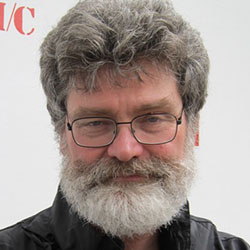Dear Fellows of the Academy of Arts and Humanities,
It is an honour and privilege to begin my term as President of the Academy of Arts and Humanities as of the end of the Celebration of Excellence and Engagement in Montreal, November 2025. I would first like to thank Sheila Embleton for her noble and selfless service, not only as my immediate forerunner in the presidency of the Academy, but also for all the other ways in which she has lent her prodigious talents and energies to the Society. I am grateful for the exemplary way in which she has discharged her duties and will do my best to live up to her standard, difficult though that will be. Second, I thank the Fellowship for placing their trust in me to direct the Academy. As I lay out below, I hope to pursue a vigorous campaign to advocate for the future of the arts and humanities in our communities and especially our post-secondary institutions.
At the COEE in Montreal, we welcomed twenty-six new Fellows to the Academy and Eric Jennings was awarded the Pierre Chauveau Medal for his distinguished contributions to knowledge in the humanities. Congratulations to one and all. Fellows in the Academy participated in the mini-colloquium on “Challenges and Opportunities in Research during Times of Crisis”: Chad Gaffield contributed to the panel on “Science at Risk, Human Progress at Stake: Safeguarding Knowledge Systems in a Fractured World,” and Isabelle Raynauld spoke on the panel regarding “The Research Situation in Canada and the United States” and showed clips from her film Tuning the Brain with Music. Five new inductees to the Society made presentations on their research to the meeting of the Academy: Gordon Campbell, Hannah Claus, Allison Glazebrook, Jonathan Kimmelman and Jacqueline Murray. One of the highlights for me at the COEE was the informal meet-and-greet for the Academy. I hope that all three of these activities will recur at COEE2026.
Also in November, a contingent of Fellows travelled to Auckland, New Zealand, to attend the meeting of the Tri-Academy Partnership on Indigenous Engagement with the Royal Society of New Zealand Te Apārangi and the Australian Academy of Science. Our Academy was represented by Marie Battiste, David Garneau and Françoise Baylis, new President of the Society. There, the attendees promoted an aspirational identity for Indigenous peoples that requires communion and challenge to restore, celebrate, adapt and invent their renewed selves and world, while simultaneously inviting one and all to bring joy, wisdom and questions to our gatherings. All considered the meeting to be an extraordinarily uplifting and productive experience.
Planning is underway for the 2026 series of RSC Dialogues to be held at Walter House in Ottawa. Fellows will receive a call for expressions of interest to speak at one the Dialogues. I shall convene the fourth Dialogue on inter-provincial commerce, and I look forward to vigorous participation in the series from Fellows in our Academy.
Let me close with another invitation to all Fellows in the Academy. The arts and humanities are under attack both within the academic community and outside. Sheila and I have posted a longer statement about the situation on the Society’s webpage. Many constituencies broadly conceive us as useless largely because our programmes do not lead to lucrative jobs. Whatever the shortcomings of these arguments, an attack on the arts and humanities constitutes an attack on the function and purpose of the university in which the study of the arts and humanities can play a leading role. We focus on the achievements, the failures and above all the striving of human beings to understand and shape not only their lives but also their relationship to one another and the world in which they live.
I invite every Fellow in the Academy to mobilize in order to communicate our message, our achievements and the ongoing need to maintain rigorous programmes in the arts and humanities throughout the Canadian post-secondary educational environment. Events, both large and small, on campus and off, in all media available to us, can help us advocate for the support we need to sustain those programmes. I encourage each of you to organize, speak with your peers and create opportunities to address this dire situation. Please let me know of initiatives you devise, not for approval but so that I may keep a log of our efforts for further communication to the Academy.
I am very pleased to introduce Alexie Tcheuyap as the new Secretary of the Academy, who will assist (and already has assisted) me in directing the Academy. He is Professor of French Studies and Dean of the Faculty of Arts at the University of Waterloo. And finally, a word about me: I am Professor of Music History at the University of Western Ontario, and alumnus of University of Toronto.
Sincerely,
James Grier, FRSC
President, RSC Academy of Arts and Humanities


